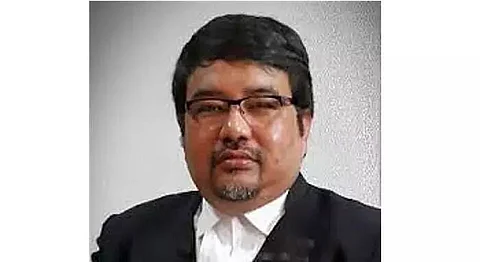
- Home
- Live Blog
- Breaking News
- Top Headlines
- Cities
- NE News
- Sentinel Media
- Sports
- Education
- Jobs

Bhaskar Dev Konwar
Any person intending to open a spa/unisex parlor in Guwahati city is required to obtain permission from the municipal corporation as per the procedure specified under section 180 of the Guwahati Municipal Corporation Act, 1971.
Recently on 13.11.2021, the Commissioner of GMC issued an order bearing No. GCS/22/2019/Pt.IV notifying guidelines for grant of trade license to Unisex Parlors, Spas, Beauty Parlors and Hair Cutting Salons with the conditions that there shall not be any exclusive rooms or chambers within the premises of the Parlor/Spa/Salon; the main doors should be transparent; there should be qualified therapists in respect of Spas/Unisex Parlors; therapy or massage cannot be provided by the opposite sex; there may be provision for a steam bath but in no case, the opposite sex can assist in any way; and the address and phone Nos. of persons visiting the aforesaid trade establishments must be maintained. The justification of the Corporation is that it is bound by public morality and laws which govern a civic society and although guided by the principle of "Ease of Doing Business" but due to several complaints received from citizens alleging malpractices in certain spas/unisex parlors, the Corporation considered it to be detrimental to a civic society.
Firstly, let us examine whether the Corporation is justified in issuing such a notification which infringes the fundamental rights of a citizen guaranteed under Articles 14,19(1)(g) and 21 of the Constitution of India. In the GMC Act which was enacted in the Year 1971, there is no specific mention of the business of unisex parlors/ spas/ beauty parlors, etc. The building by-laws of the Corporation also doesn't contemplate that there shall be exclusive rooms or chambers within such premises and the main doors must be transparent. Although the order makes it mandatory to have qualified therapists but the appropriate authority of the Government is yet to notify any such special qualifications.
The Madras High Court in the case of Ms. KadekDwi Ani Rasmini v Mr. K Natrajan, while quoting the entire history of massage, laws on prostitution and immoral trafficking has stated in its judgement that " A health spa, where cross-gender massages is a worldwide phenomenon, there is no legal prohibition and to borrow the wordings of the Hon'ble Supreme Court, except the majoritarian impulses rooted in moralistic tradition which is attempting to impinge upon individual autonomy."
The Court while considering the entire action as illegal observed that, "This is clearly a case of colorable exercise of power. If this power goes unchecked, Spa Centre or a Massage Parlor can be run only under the mercy of a Police Officer. For an extraneous consideration, the Police can brand any Spa or Massage Centre as a brothel and even if the brothel is being run in the name of a Spa or a Massage Centre, no action will be taken. This situation is neither good for the society nor to the Police force." Similar order issued by the Municipal Corporation of Delhi regarding cross massage and other allied restrictions have already been put to challenge before the Delhi High Court and presently such restrictions are kept on hold.
The GMC order completely overlooks that even a transgender has a right to work as a therapist. Even the requirement of furnishing details of the client is an invasion of privacy and there are chances of such data being misused. In such establishments, separate or exclusive rooms are not only necessary for therapy or massage but there are many other services like facial, bleaching, pedicure, manicure, etc., where the clientele may prefer to do it in private rooms. There is no qualitative ascertainable data provided by the Corporation about police cases registered against such establishments for illegal activities.
The Madras High Court observed in its judgement that, "Banning cross gender massaging will not guarantee stopping of illegal activity-with the gay and lesbian community on the rise, sexual favours are no longer a heterosexual domain, hence these may continue even in a same- gender scenario." In every profession, there will be rotten apples but that doesn't justify unreasonable restrictions. The Madras High Court also states that, "When it comes to the role of gender in the massage and bodywork profession, the spectrum of issues is great. And despite all that we might do to evade the topic, gender and subsequently, sexuality always come back to somehow factor into the equation. It's important to recognize that both female and male therapists are subjected to the kinds of abuse that can happen behind closed doors. Clients that grope, ply for a date, or drop sexual innuendos affect both male and female therapists." There is no special law regulating massage centers/spas, etc. If the Corporation desires to regulate the business/ profession of health centers, massage parlors and spas, they must first take recourse either to the enactment of a legislation or to the issue of rules/by-laws in exercise of the power conferred by the respective enactments to make subordinate legislations in terms of the provisions of the Guwahati Municipal Corporation Act, so that public order, decency and morality, which can form the basis for a regulatory law under Article 19(2) of the Constitution are taken of.
The Madras High Court also observed that "Whatever be our pre-conceived notions about a Spa and a Massage Center, due to various factors influencing our thoughts and behavioral patterns, there is always a scope to evolve and start looking at things in a right perspective. Each day, many of us unintentionally place limitations on ourselves by way of our conditioned mind. What we perceive as a purely natural reaction may actually be creating limitations for us and take away our inherent ability to empower ourselves. It's time we get out of that conditioning and look at the science and real purpose behind Massage and Spa Centers."
Also watch: